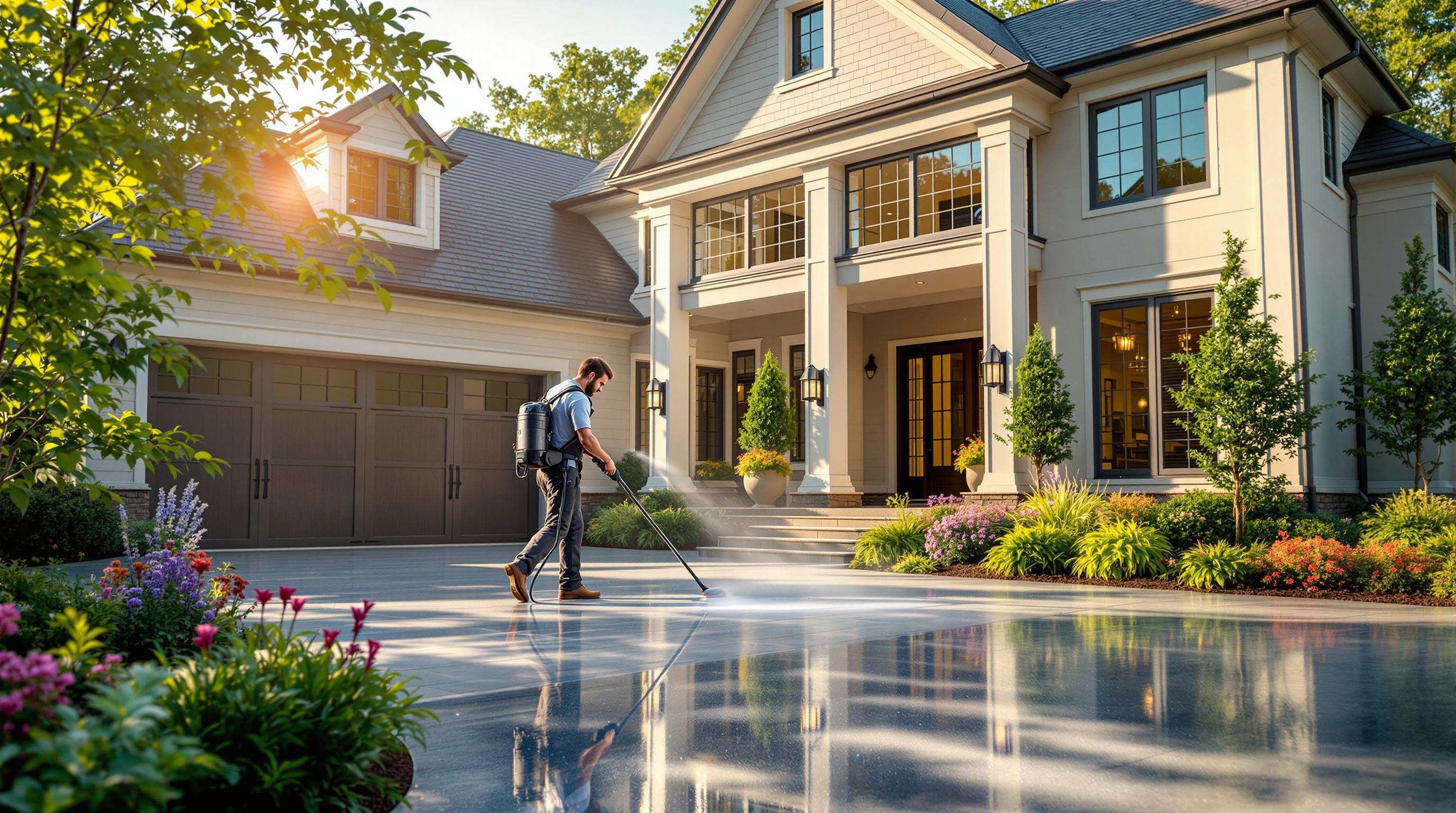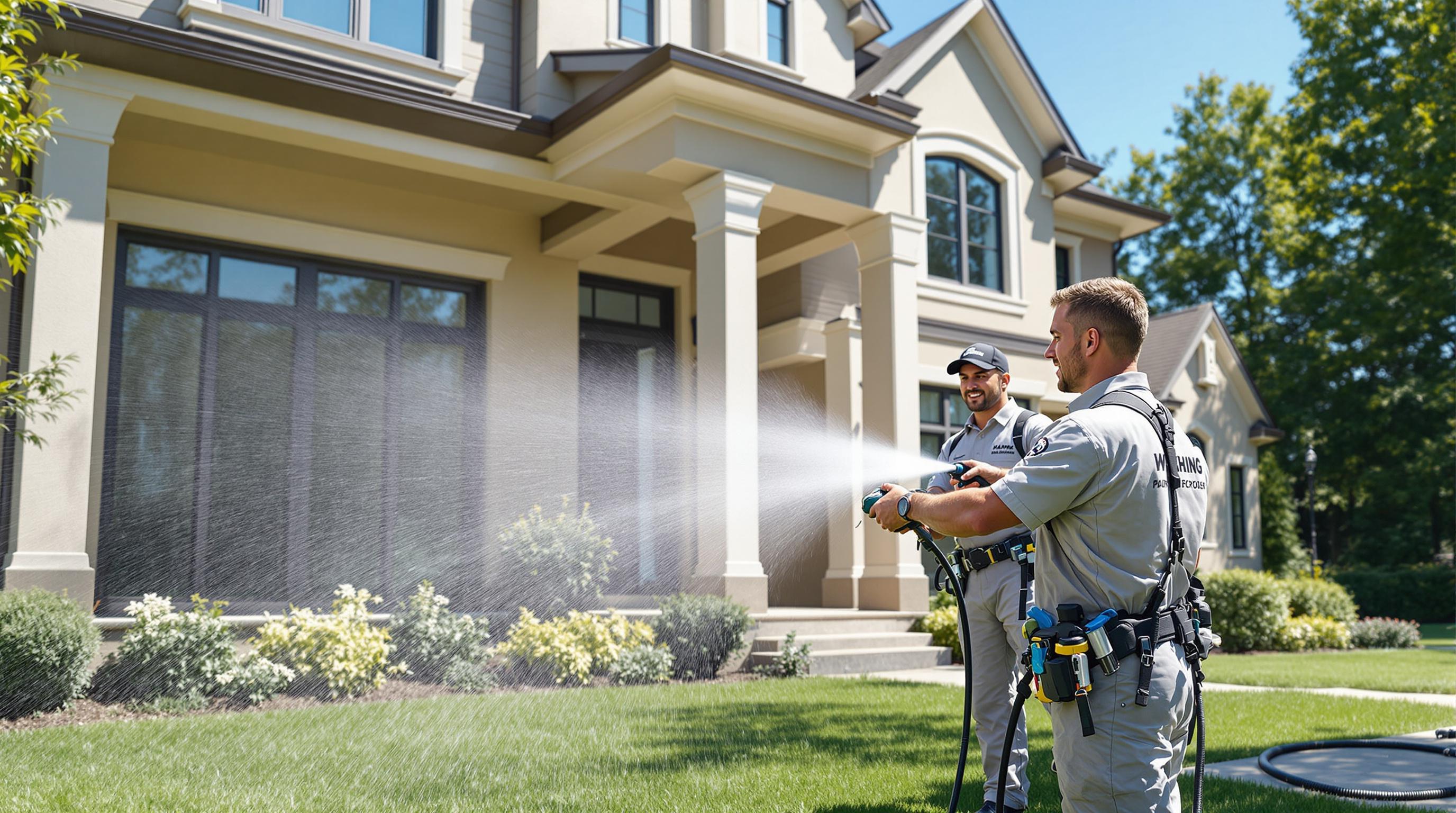Pressure washing your home keeps it clean, prevents damage, and boosts curb appeal. Each season has unique challenges, like winter grime, spring pollen, summer humidity, and fall debris. Here's a quick seasonal breakdown:
- Spring: Clean winter residue and tackle pollen buildup.
- Summer: Control mold and mildew caused by heat and humidity.
- Fall: Remove leaves, clean gutters, and prep for winter.
- Winter: Only wash when temperatures are above 40°F to avoid freezing.
Pressure washing protects your home year-round, prevents issues like mold and wood rot, and can even raise your home's value by 2-5%. Stick to this seasonal schedule for the best results.
What Is The Best Time Of Year To Wash a House?
Spring: Post-Winter Cleanup
After winter's harsh weather, it's time to clean your home's exterior to prevent damage and prepare for spring. In Cary, NC, the combination of humidity and pollen creates specific challenges, making spring cleaning especially important.
Cleaning Up Winter's Mess
Winter can leave behind grime and residue that harm your home's surfaces. Here's a quick guide to tackling it:
| Surface | Winter Residue | Recommended Action |
|---|---|---|
| Siding | Dirt, sediment, mold | Soft wash at 1,300-1,600 PSI |
| Driveways | Salt, mud, debris | Standard pressure wash |
| Walkways | Salt residue, soil | Targeted cleaning |
"Pressure washing is a highly effective cleaning method that uses high-pressure water to remove dirt, mold, mildew, algae, and other contaminants from surfaces." - Triangle Pro Painting
Managing Pollen Season
Spring in Cary is also pollen season, which can lead to noticeable buildup on exterior surfaces. When pollen combines with moisture, it can create tough stains. Experts recommend:
- Using gentle washing techniques for siding and driveways
- Scheduling regular cleanings during peak pollen times
- Addressing stains early to avoid permanent damage
Don't forget about outdoor spaces - they need attention too.
Prepping Outdoor Areas
Focus on these areas to get your outdoor spaces ready:
Deck and Patio Cleaning
- For wood decks: Use 500-1,500 PSI with a wide nozzle
- For composite decks: Follow the manufacturer's cleaning instructions
- Remove mold and algae to avoid slippery surfaces
Outdoor Furniture Clean using 500-1,200 PSI, depending on the material.
Real estate experts highlight that maintaining outdoor areas can boost home value by up to 5%. Regular cleaning not only improves curb appeal but also extends the life of surfaces and ensures outdoor safety.
Summer: Heat and Humidity Challenges
Keeping your home's exterior in good shape during summer can be tricky due to high temperatures and humidity. Here's a guide to help you handle these challenges effectively.
Mold and Mildew Control
Cary's humid weather increases the likelihood of mold growth. If left unchecked, mold can lead to wood rot, peeling paint, damaged siding, and even structural issues. Regular pressure washing is a simple way to tackle mold and mildew, protecting your home's exterior and helping it last longer.
Outdoor Entertainment Areas
Decks and patios are popular hangouts during summer, but they can quickly collect mud, debris, algae, and mold. A professional cleaning once a year can not only keep these areas looking great but also make them safer by reducing slip risks. Plus, it preps the surfaces for re-staining or sealing, keeping them in top condition.
Hot Weather Washing Tips
Pressure washing in hot weather requires some extra care:
- For vertical surfaces, start washing at the bottom and work your way up, then rinse from the top down to avoid streaks.
- Adjust the pressure settings depending on the surface. Use lower pressure for delicate areas and higher settings for tougher spots. Always test on a small, hidden area first.
- Keep a safe distance from surfaces and avoid spraying water near air conditioning units, electrical outlets, loft vents, or window seals.
sbb-itb-8e2a680
Fall: Winter Preparation
Fall is the perfect time to get your home ready for the challenges of winter. Pressure washing can help remove dirt and debris, protecting your home from potential damage caused by buildup.
Leaf and Debris Removal
During fall, leaves and debris tend to pile up on your home's exterior. When wet, they can stain surfaces and even promote mold growth. Regular pressure washing during this season helps prevent stains, reduces moisture buildup, and removes decomposing materials that could harm protective sealants. Plan your cleaning after most of the leaves have fallen but before temperatures drop below freezing to ensure everything dries completely. Afterward, don’t forget to check and clean your gutters for proper water drainage.
Gutter Maintenance
Once surface debris is cleared, it’s time to focus on your gutters. Clean gutters are crucial for avoiding winter damage. Check for cracks, loose sections, or other issues. Remove large debris by hand, then use pressure washing to flush out smaller buildup. This helps reduce the risk of ice dams and prevents water damage to your foundation and walls. Test each downspout to ensure water flows away from your home efficiently.
Protecting Surfaces Before Winter
Take steps to safeguard key surfaces around your home:
- Siding: Clean off dirt, sediment, and mold that could trap moisture during freezing and thawing cycles.
- Wood Surfaces: Remove debris to prevent moisture from soaking in and causing rot.
- Concrete Areas: Clear away stains and debris, which can worsen with winter precipitation.
Choose a mild, sunny day for pressure washing to allow surfaces to dry fully and avoid potential moisture damage. These fall maintenance tasks will help ensure your home is ready for winter’s challenges.
Winter: Cold Weather Guidelines
Winter brings its own set of challenges when it comes to cleaning, especially in regions like Cary with relatively mild winters. While occasional cleaning is possible, proper winter maintenance is essential to keep your home in good shape throughout the year.
Temperature Restrictions
Temperature plays a big role in winter pressure washing. For safe and effective cleaning, outdoor temperatures need to stay above 40°F. This prevents water from freezing, avoids equipment damage, and reduces safety risks.
"It's not the best idea to power wash when the outside temperature is below 40 degrees. Cold temps like this can damage our pumps, cause the water to freeze as we spray it onto your home, put our employees at risk of hypothermia, and just makes for less effective cleaning, in general." – Squeegee Squad
Plan your cleaning during the warmest part of the day and check the forecast to ensure temperatures stay consistently above 40°F. This also gives surfaces enough time to dry properly. Once temperature concerns are handled, focus on areas where sunlight can help speed up the process.
Cold Weather Projects
For winter cleaning, prioritize outdoor areas that get plenty of direct sunlight to reduce freezing risks. Using warm water (between 180°F and 200°F) can help prevent freezing and speed up drying. Additionally, applying de-icing products to walkways beforehand can make the process safer by reducing slip hazards.
Material-Specific Cleaning Guide
When cleaning outdoor surfaces, it's important to match your methods to the material. This ensures surfaces stay in good condition while looking their best.
Siding Materials
For vinyl siding, stick to a gentle approach with mild detergent and water. High-pressure washing is not recommended as it can lead to moisture problems and damage.
"We do not recommend power washing vinyl or polymer siding as it can cause moisture intrusion, damage, and/or discoloration. Instead, we suggest using a house wash that connects to your hose. This is the simplest and most effective way to clean stubborn siding stains."
For stubborn stains, common household cleaners like Fantastik, Murphy's Oil Soap, or Windex can help. Steer clear of harsh chemicals like paint thinner, nail polish remover, or undiluted chlorine bleach.
To tackle mildew, mix 1/3 cup detergent, 2/3 cup trisodium phosphate, 1 quart of 5% sodium hypochlorite, and 3 quarts of water.
Safe Roof Cleaning
Soft washing is the best method for roofs, as it protects shingles while using biodegradable detergents. In Cary, roof cleaning costs typically range from $220 to $409, depending on the roof's size and how dirty it is. Regular cleaning not only keeps your roof looking good but also helps avoid costly damage over time.
Hard Surface Care
Driveways, patios, and other hard surfaces can handle more pressure, but the method should match the material:
| Surface Type | Method | Considerations |
|---|---|---|
| Concrete | High-pressure | Ideal for sidewalks and driveways |
| Pavers | Soft washing | Protects joint sand |
| Stained Concrete | Low-pressure | Preserves decorative finishes |
| Pool Decks | Moderate pressure | Keeps slip-resistant texture intact |
Wood Structure Maintenance
When cleaning decks and fences, use soft washing to remove dirt and organic buildup without harming the wood. Keep the spray at a steady distance and use a wide nozzle to avoid gouging the surface. Using the right technique helps maintain the natural beauty of wood and extends its lifespan.
Year-Round Maintenance Schedule
Keeping up with regular pressure washing not only shields your home but can also increase its value by 2-5% when combined with touch-up painting. Each season brings unique challenges: spring tackles winter grime and pollen, summer combats mold in humid conditions, fall preps your home for colder weather, and winter focuses on urgent tasks while planning for spring.
Here’s a breakdown of seasonal maintenance tasks:
| Season | Focus Areas | Benefits |
|---|---|---|
| Spring | Clear winter residue, remove pollen | Reduces allergens and refreshes curb appeal |
| Summer | Prevent mold, clean outdoor spaces | Protects surfaces and keeps entertainment areas ready |
| Fall | Gutter cleaning, winter prep | Reduces freeze-related damage and water issues |
| Winter | Handle urgent cleaning, plan for spring | Tackles immediate concerns and secures early bookings |
Using professional pressure washing equipment ensures surfaces are cleaned thoroughly and safely. This method helps avoid damage while extending the life of your home’s exterior. Stick to this schedule to safeguard your property and keep it looking great all year.


